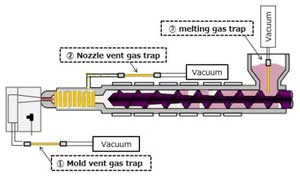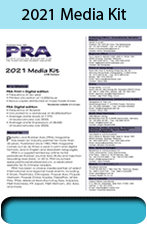Polyplastics’s new test identifies gas formation to reduce mould deposits

Japanese supplier of materials Polyplastics says it has developed a testing method that identifies gas formation during the injection moulding process and helps to reduce mould deposits. The company’s Gas Investigation Method in Injection Moulding (GIMIM) facilitates continuous moulding and improves production efficiency.
During the injection moulding process, harsh conditions (high temperature, high speed) and deterioration of plastic additives can release high volumes of decomposition gases. Mould deposits, gas burns, and short shots caused by pyrolysis gas can lead to quality problems, including undesirable effects on the dimensions and appearance of products, resulting in a higher defect rate. Maintaining highly efficient production operations is important as manufacturers work to meet today’s highly challenging applications such as automotive electrification and automation.
Polyplastics’ proprietary method captures and evaluates the gases formed during moulding and identifies the mechanism by which pyrolysis gas forms during injection moulding. The proprietary method traps gases according to mould-based methods, uses gas chromatography mass spectrometers (GC/MS) to qualitatively and quantitatively analyse their composition, identifies the gases that are formed, and makes fundamental improvements to the sources of their formation.
This simple system configuration is divided into the three stages of plasticisation, metering, and injection, and each unit is fitted with gas traps to seclude the gases that form within each part of the process. GIMIM can reflect the actual circumstances during molding by directly trapping and analysing the gases formed during moulding.
GIMIM makes it possible to measure high-molecular-weight substances that can cause mould deposits. Since this method directly analyses gases that are formed inside the mould during filling, the company believes it yields results that are closest to real-world conditions.
In further research, Polyplastics says it plans to examine other problems caused by pyrolysis gas such as short shots and gas burn defects, as well as mould deposits.
Polyplastics’s product portfolio includes POM, PBT, PPS, LCP, RENATUS, and COC. The company has the largest global market share of POM and LCP.
(IMA)Subscribe to Get the Latest Updates from IMA Please click here
©2021 Injection Moulding Asia. All rights reserved.












